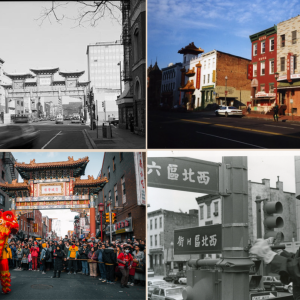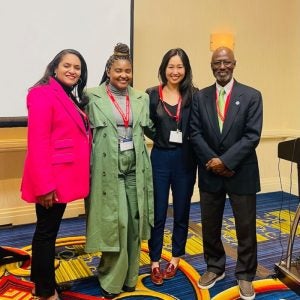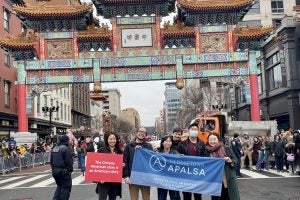The Institute’s Policy Clinic involves students in each of our policy teams to advance client goals: community equity, health/food, labor/human rights, and trade/climate. See links to the right for student projects and the work of each team.
Harrison Institute News
Featured Events
 6:00-7:30pm
Gewirz 12th Floor & Zoom
Stories from DC and Philadelphia Chinatowns
6:00-7:30pm
Gewirz 12th Floor & Zoom
Stories from DC and Philadelphia Chinatowns
On April 17, 2023, the Harrison Institute will host a panel at the Law Center featuring students Claris Park, Eli Lee, and Justin Chuang, who will discuss their research on some of the post-pandemic challenges facing Chinatowns across the United States. In "Talk Story! Public Policy and Cultural Centers: Stories from DC and Philadelphia Chinatowns," the students will be joined by Jack Lee and Harry Leong, who will share their experiences as longtime residents and stakeholders in Philadelphia and DC Chinatown. The program is co-sponsored by the 1882 Foundation as part of its Talk Story series and will be open to the public. Register at the link in the title or here: https://www.eventbrite.com/e/public-policy-and-cultural-centers-stories-from-dc-and-philadelphia-tickets-597805120207
Featured Events
 2:00-3:30pm
Zoom
Stop Asking Us to be Resilient: Community Perspectives on the “Resilience” Myth
2:00-3:30pm
Zoom
Stop Asking Us to be Resilient: Community Perspectives on the “Resilience” Myth
On April 5, Jennifer Li will join climate justice experts Ashley Shelton (Power Coalition for Equity and Justice), Asti Davis (Deep South Center for Environmental Justice), and Dennis Chestnut (Resilience Hub Community Coalition) for a virtual discussion to explore some of the opportunities and challenges that frontline communities face when confronting climate disasters. The discussion will contrast the pursuit of "resilience" as a climate adaptation goal against the need for long-term, permanent policies that address systemic inequality in the United States and globally. The panel will be the first of a four-part series on "Responding to Climate-Amplified Extreme Weather Events," and is sponsored by the National Adaptation Forum, the C02 Foundation, and EcoAdapt. Register at the link in the title or here: https://nationaladaptationforum.org/upcoming-virtual-events/extreme-weather/
Featured Events
 6pm-7pm
Zoom
The Law & Policy of Industrial Animal Agriculture
6pm-7pm
Zoom
The Law & Policy of Industrial Animal Agriculture
On April 4, 2023, Sara Hoverter will join a panel of environmental and food law experts to discuss legal and policy issues in industrial animal law agriculture. She will be joined by Peter Lehner (Earthjustice), Tim Sullivan (EPA), and Amy van Saun (Center for Food Safety). The event is sponsored by the Georgetown Environmental Law Society.
Featured News
 January 22, 2023
Community equity
January 22, 2023
Community equity
Students in the Policy Clinic and the Georgetown Asian Pacific American Law Students Association were invited to march in the 2023 Lunar New Year Parade in DC Chinatown to celebrate the Year of the Rabbit (also known as the Year of the Cat). In 2022-23, students in the Policy Clinic's Community Equity Team (Claris Park, Eli Lee, Justin Chuang) are working with supervising attorney Jennifer Li and the office of DC Councilmember Brooke Pinto to implement policies that will help ensure the survival of DC Chinatown, with focus on affordable housing, small business development, and other community priorities.
Featured News
November 16, 2022
Oral Health
Sara Hoverter and dental hygienist Brittany Harris presented to the D.C. Board of Dentistry on options to expand dental hygienist scope of practice and improve oral health access in D.C. Students Emily Schneider and Blake Hite have been working with dental hygienists in the District to support advocacy efforts and create a strategic plan for change at the Board of Dentistry and the D.C. Council to ensure that every person in the District has access to affordable, quality dental hygiene services.
Featured News
March 28, 2022
Worker Rights
Sara Hoverter and Bob Stumberg participated in the kick-off meeting for University of California partners for the Just Purchasing Consortium, including staff from foodservice, sustainability, and procurement; faculty; and students. Bringing together Georgetown, University of California, and University of Michigan partners, Harrison staff presented the plans for the Robert Wood Johnson Foundation-funded project and participated in breakout conversations about opportunities to protect poultry workers using universities' purchasing power.
Featured News
April 1, 2021
Health & food
The Robert Wood Johnson Foundation has awarded a 3-year grant of $970,000 to the Harrison Institute to organize a Just Purchasing Consortium (JPC). The JPC will counter forced labor, wage theft, health hazards, and other abuses endured by workers who supply food to universities. Other collaborators including the Workers’ Rights Institute and the Kalmanovitz Initiative at Georgetown, the University of Michigan, and the University of California system. The grant supports work in 2022 by Sara Hoverter, Robert Stumberg, and students in the policy clinic to draft a purchasing code and develop a dashboard to show hot spots for abuses of labor rights and urgent occupational health impacts, including COVID.



